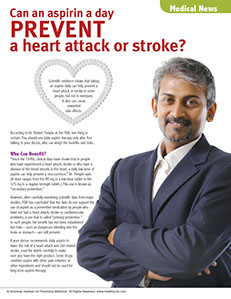SYMPTOM CHECKER
CONDITIONS
Male
Female
Child
Arm, Hand & Shoulder Concerns
Legs & Feet Concerns
Dental & Mouth Concerns
Ear & Nose
Eye Conditions
Head Conditions
Arm, Hand & Shoulder Concerns
Legs & Feet Concerns
Front
Back
Arm, Hand & Shoulder Concerns
Dental & Mouth Concerns
Ear & Nose
Eye Conditions
Head Conditions
Arm, Hand & Shoulder Concerns
Dental & Mouth Concerns
Ear & Nose
Eye Conditions
Head Conditions
Front
Back
Arm, Hand & Shoulder Concerns
Neck Links
Head & Neck Concerns
Arm, Hand & Shoulder Concerns
Neck Links
Head & Neck Concerns
Front
Back
Online Clinic
Wise Healthcare
Can an aspirin a day prevent a heart attack or stroke?
Print on Demand
Scientific evidence shows that taking an aspirin daily can help prevent a heart attack or stroke in some people, but not in everyone. It also can cause unwanted side effects.
According to Dr. Robert Temple at the FDA, one thing is certain: You should use daily aspirin therapy only after first talking to your doctor, who can weigh the benefits and risks.
Who Can Benefit?
“Since the 1990s, clinical data have shown that in people who have experienced a heart attack, stroke or who have a disease of the blood vessels in the heart, a daily low dose of aspirin can help prevent a reoccurrence,” Dr. Temple said. (A dose ranges from the 80 mg in a low-dose tablet to the 325 mg in a regular strength tablet.) This use is known as “secondary prevention.”
However, after carefully examining scientific data from major studies, FDA has concluded that the data do not support the use of aspirin as a preventive medication by people who have not had a heart attack, stroke or cardiovascular problems, a use that is called “primary prevention.” In such people, the benefit has not been established but risks—such as dangerous bleeding into the brain or stomach—are still present.
If your doctor recommends daily aspirin to lower the risk of a heart attack and clot-related stroke, read the labels carefully to make sure you have the right product. Some drugs combine aspirin with other pain relievers or other ingredients and should not be used for long-term aspirin therapy.
This website is not meant to substitute for expert medical advice or treatment. Follow your doctor’s or health care provider’s advice if it differs from what is given in this guide.
The American Institute for Preventive Medicine (AIPM) is not responsible for the availability or content of external sites, nor does AIPM endorse them. Also, it is the responsibility of the user to examine the copyright and licensing restrictions of external pages and to secure all necessary permission.
The content on this website is proprietary. You may not modify, copy, reproduce, republish, upload, post, transmit, or distribute, in any manner, the material on the website without the written permission of AIPM.
2021 © American Institute for Preventive Medicine - All Rights Reserved. Disclaimer | www.HealthyLife.com
















































